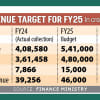Revenue growth slows as import dips

Revenue collection in Bangladesh grew 14.3 percent year-on-year in the first quarter of the current fiscal year although the pace was slower owing to a decline in imports, official figures showed yesterday.
The tax administration raised Tk 76,751 crore in July-September of 2023-24, up from Tk 67,127 crore in the same period a year, according to the provisional data from the National Board of Revenue (NBR) showed.
Despite the growth, overall tax receipts were shy of Tk 8,195 crore from the periodical target of Tk 84,946 crore set by the government for the NBR.
The tax authority will require to post a 30 percent year-on-year growth to hit the overall goal of Tk 430,000 crore for 2023-24, a target that analysts described as tough at the beginning of the fiscal year.
Yesterday, Towfiqul Islam Khan, a senior research fellow at the Centre for Policy Dialogue, echoed the same sentiment.
"There will be a shortfall as compared to the annual target set in the budget."
Figures from the NBR, which collects about 85 percent of overall taxes for the state, showed that receipts from customs tariffs recorded the slowest growth in July-September as imports dipped owing to the US dollar shortage and curbs imposed by the central bank to discourage non-essential purchases.
Revenue receipts from customs rose 7.45 percent to Tk 24,128 crore in the first three months of FY24. Imports plunged 22 percent in July-August, according to the Bangladesh Bank.
However, the collection of value-added tax (VAT) and the supplementary duty (SD) from domestic businesses grew at a faster rate.
The NBR collected Tk 28,982 crore from VAT and SD in three months to September, recording an 18 percent growth. The growth stood at 16 percent in the identical quarter a year ago.
"Undoubtedly, the increase in commodity prices aided the mobilisation of revenues. A new income tax law was also beneficial," said Khan.
Income tax collection rose 17.4 percent to Tk 23,651 crore.
Khan said despite the significant currency depreciation, there has been little increase in revenue from external sources, which is indicative of import restrictions.
The taka has lost its value by about 28 percent against the US dollar in the past 18 months.
Going forward, the likelihood of collecting revenue will rely on several variables, according to the economist.
"Commodity prices are on the rise. And owing to the taka's continued depreciation and the potential for an increase in the price of oil globally could be beneficial for revenue collections. However, the common people will be the ones who will continue to suffer as a result since inflation could go up further."
He said the government's constrained financial resources are now reflected in its policies, including the authorities' unwillingness to permit tax relief to consumers.
"Reducing tax evasion and putting the promised measures into action will be crucial. Nevertheless, there will be a shortfall in revenue collection as compared to the annual target."

 For all latest news, follow The Daily Star's Google News channel.
For all latest news, follow The Daily Star's Google News channel. 







Comments